Iran’s long-standing quest for nuclear weapons was at least set back for many months, and probably several years. This is the moment for American leadership.

White House working towards a meeting with Iran
The White House says President Donald Trump is still seeking to develop longstanding peace through diplomacy with Iran.
After 12 days of Israeli air strikes, Iran’s air defenses were largely disabled, above-ground nuclear facilities destroyed, and much of its ballistic missile production and launch capacity wrecked. Nevertheless, Iranian retaliation caused destruction and loss of life in Israel. Then the United States entered the fight on the evening of June 21.
Iran’s three principal, known nuclear enrichment sites were pounded and penetrated with 14 of the 30,000 Massive Ordnance Penetrators and more than two dozen sea-launched cruise missiles. By the early morning of June 24, Tuesday, Iran and Israel had agreed to a ceasefire in the destructive campaign each was waging against the other.
It was a triumphant moment for President Donald J. Trump, under whose direction the U.S. armed forces had launched the largest, most complex stealth bomber and Tomahawk strikes ever undertaken.
Iran’s long-standing quest for nuclear weapons was at least set back for many months, and probably several years.
Many parties had much to gain from the ceasefire:
- For Israel, a relief from the imminent threat of Iran, and from the punishment of the Iranian missiles.
- For Iran, an end to Israeli efforts at regime change; for the neighbors in the region, a relief from the fear of a widening conflict.
- For Russia, the preservation of its strategic partner, Iran.
- For China, an end to the imminent threat to its fuel and gas transiting the Strait of Hormuz.
- For President Trump, a validation of his judgment that overwhelming American power could be effective in ending a conflict without embroiling us in a “forever war,” an end to the split of his MAGA supporters and wide acknowledgement of his personal role in creating the ceasefire.
What happens now for Iran and the rest of the world?
But now what?
Israel has been highly successful in the use of military force over many decades in the region – from the 1948 war of independence, through the 1956 war in Sinai, the 1967 preemptive war against Egypt, Jordan and Syria, the 1973 war, the 1982 invasion of Lebanon, strikes against the Palestine Liberation Organization in Tunisia in 1985, and later operations in Lebanon and Gaza.
U.S. military action in the Persian Gulf War in 1991 and the invasion of Iraq in 2003 were also highly successful. At this time, Israel, with U.S. help, has stripped Iran of its protective shields of Hezbollah and Hamas, and Iran, without effective air defenses, is laid bare.
But outstanding military operations are not sufficient – they must be followed by successful work to end the roots of the conflict. Not once has this happened in the Middle East. Hatred, resentment, anger, terrorism and war have become endemic to the region.
This is the moment to end the pattern of continuing conflict. But that requires new appreciation among the leaders in the region of the realities underscored by this latest bout of conflict.
Iran, you’re not going to have a nuclear bomb, no matter what. And if you continue to seek it, your regime will be defeated along with the destruction of your country. Israel, you cannot continue to use force with impunity – even with the best technology, your own people are vulnerable.
To others in the region: Israel and the Palestinians are both permanently in the region; and with all due respect to the different religion, sects and ethnicities at play, and the pain of history, both must be accommodated, accepted and, ultimately, embraced as part of a thriving and prosperous Middle East.
If there was ever a moment for fundamental change within the region, this is it. The world has come face to face with the potential of a spiraling conflict. Many of the Gulf states have achieved unprecedented wealth and are on the path to world-leading economic, social and technical advances. The region is still and will likely remain the center of global energy production, distribution and investment. There is everything to gain from seizing this moment.
This is the moment for American leadership
But how to proceed?
Based on the model followed by President Bill Clinton in dealing with the Balkans in the 1990s, it is best to start with a set of principles agreed upon objectively, by those outside the conflict but with the influence and will to deal with the respective parties.
The principles must be fair and practicable. It required many weeks of shuttle diplomacy for the much simpler issues in the Balkans, and then, ultimately a 78-day air campaign by NATO in parallel with presidential-level mediation by outside parties. In all, it entailed more than five years of continuous effort by the United States.
In the Middle East, the issues are deeper and more complex, but certainly among the principles, Iran must renounce its efforts, overt and covert, to destroy the state of Israel, and Israel must respect the rights of the Palestinians in the West Bank and Gaza to govern and develop their own self-governing state.
Terrorism against Israel must be halted. Countries in the region must participate in rebuilding the Palestinian homeland in the West Bank and Gaza.
Sanctions against Iran should be lifted, and Iran would be provided the materials it needs for peaceful nuclear energy.
Progress must be phased and accompanied by confidence-building measures. Perhaps the Abraham Accords could be fully implemented, and the United States would provide a security umbrella for all in the region. International organizations will no doubt remain part of the solution. Perhaps Russia and China, and other interested parties, could be invited as observers.
Iran today is a wounded tiger. Maybe 400 kilograms of highly enriched uranium is still available, maybe some other country will provide nuclear weapons or materials. Revenge will be sought. We cannot permit the next conflict – it could well go “nuclear.” So neglect or failure are not options.
This is the moment for American leadership. It is the moment for President Trump to exercise his broader vision for strategic realignment of the region, and in so doing, to end the Middle East as a cockpit for continuing conflict.
Wesley K. Clark is a retired four-star general who served as commander of U.S. Southern Command and then as commander of U.S. European Command/Supreme Allied Commander, Europe.






